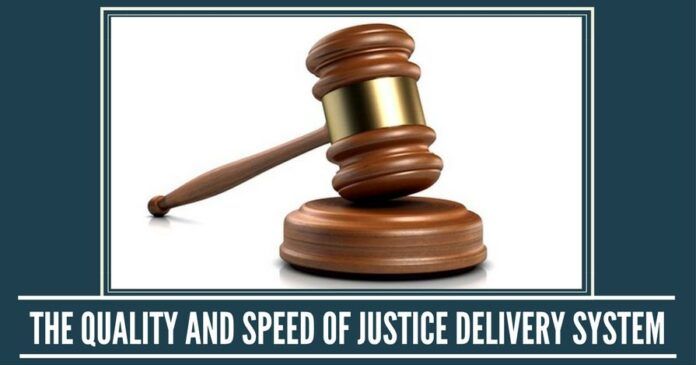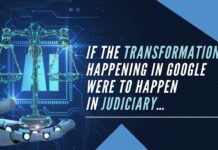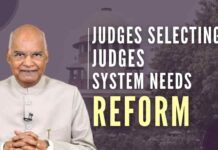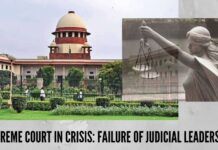
The people should demand that courts should start re-interpreting the meaning of the “99:1” principle
Most of us are frustrated with the quality and speed of our justice delivery system. But, are there any solutions?
During a discussion with some readers of the Tamil magazine Thuglak, Retired High Court Judge Sri. T. N. Vallinayagam (a judge of repute), said, “A basic principle of our legal system is that 99 criminals may escape, but one innocent should not be punished. So, we hear lots of voices of human rights activists. In today’s context, I believe this premise should be changed.
“Today, if someone is charged in a case, the burden of proof of guilt is on the complainant/ prosecution. If this is changed to place the burden of proof of innocence on the accused, I believe resolving cases will become very simple.
“For example, let’s say there is a theft in a house, and there is a CCTV footage of a thief jumping over a wall in the house; there is also a fingerprint of the thief at the spot of theft. On this basis, a case is registered against him. Law says that still, when the accused is produced in a court, the burden of proof is on the complainant/ prosecution to establish that he is the culprit, with sufficient witness and evidence.
“This creates a lot of practical difficulties in getting a conviction. Instead, in the context of the prima facie CCTV footage and fingerprint evidence, if the onus of proof of innocence as to why he jumped over the wall and how his fingerprints were in the spot of theft were on the accused, the case would be solved easily.
“If only the onus of proof of innocence were placed on the accused once a prima facie case is established, most of the criminal cases will be closed easily.”
“Let’s say someone beheads his wife and surrenders in a police station with the beheaded head in hand. Even then, the police should prove that she was his wife, he beheaded her, produce the weapon, explains the motive for the murder, and produce witnesses to get a conviction. Even if there’s a small inconsistency, the murderer will go scot-free. In such cases, the onus of proof of innocence must be on the accused.
“Similarly, if you are caught with Rupees 2 crores of unaccounted money, under the Income Tax Act, the onus of proof of your source of income must be upon you. Similarly, if you imported any item, the onus of proof should be on you about the bona fide nature of the transaction.
“If only the onus of proof of innocence were placed on the accused once a prima facie case is established, most of the criminal cases will be closed easily.”
Has our “99:1” outlook led to higher quality of judgments? Do we believe we get the right judgments, even discounting wrong judgments due to corruption? What is the % of times when a case is judged the same way up the chain of courts? When this % is low, how can we claim 99 criminals may escape, but even one innocent is not punished?
Let me highlight how outrageous the logic of “let 99 criminals escape; one innocent should not be punished” is a hypothetical example. Let’s say a judge knows that out of a group of 100 people, one is innocent and 99 are terrorists. There is no clue as to who is innocent, but it is clear that 99 of them are terrorists. Should he acquit all the 100?
Let’s say those who argue in favour of the “99:1” principle own a business in which they know that 99 employees in a group of 100 have been cheating the business of crores of rupees; they don’t know who is the innocent one. Will they retain all the 100 giving the benefit of the doubt?
Even in the case against Ms Jayalalithaa, former CM of Tamilnadu and her accomplices (including Ms Sasikala), while finally judging the case upon appeal, the Hon’ble Supreme Court said in DA Cases, the onus of proof of the source of income is on the accused. So, they have set a very good precedent.
Criminal cases are typical ‘Tom and Jerry’ game, where Jerry always (well, almost always) wins. We tie down the hands and legs of the complainant, the police, the prosecution and the judiciary, and give wings to the accused, and expect a high rate of conviction. When this doesn’t happen, we blame the police, prosecution or judiciary.
Under pressure to get at least some convictions, police subvert the law in many low-profile cases, planting evidences and witnesses, to punish the innocent.
I was listening to an interview with Mr P. Chidambaram by Rangaraj Pandey of Thanthi TV. PC said all the money that has returned to banks post-demonetisation is white money; just because the Government has identified Rs 3.8 lakh crores of unaccounted money in banks, it doesn’t become black. The Income Tax Department has to serve notices to the lakhs of such people, receive their replies, seek clarifications, and where not admitted by the depositors, each of the cases has to go through the several tribunals and courts, proved beyond doubt that they are indeed black money, and then only the money become black.
Technically he is right. This is how liberals, criminals, and legal fraternity have joined hands to subvert our legal system. No wonder, under pressure to get at least some convictions, police subvert the law in many low-profile cases, planting shreds of evidence and witnesses, to punish the innocent, defeating the very purpose of the principle of “99:1” easily.
In an increasingly criminalised and radicalised world, we, the people, should demand that courts should start re-interpreting the meaning of the “99:1” principle, that this applies only up to the point of establishing a prima facie case; after that, the onus of proof of innocence should be on the accused.
Many senior lawyers will protest; regardless, we the common people and well-meaning retired judges like Sri. Vallinayagam should fight and bring about this change in legal interpretation.
This one change will have far-reaching consequences to justice delivery system in India, speeding up case closures, yet enhancing the quality of judgments, and bringing down crime.
Note:
1. The views expressed here are those of the author and do not necessarily represent or reflect the views of PGurus.
- How BJP can get 33%+ vote share in TN - April 1, 2024
- A transparent, equitable electoral funding alternative - March 19, 2024
- How TN BJP can come to No. 1 or No. 2 in 2024 LS polls - January 11, 2024











On the face of it it does make sense, no doubt. But we have at least one law-the RTI Act- where the onus of proving innocence is on the defaulting Public Information Officer. And look at how many of them have been penalised by the incompetent/treacherous information commissioners!
[…] I have been calling for many changes in our justice delivery system, the most important one being, “once prima facie guilt is established on anyone by a court, placing the burden of proof of innoce… […]
[…] How To Improve The Quality And Speed Of Justice Delivery System? A Retired Judge Provides Solution – Nov 13,2017, PGurus.com […]
Is this a mindset of judges to follow 99:1 principle ? Let’s say judge goes by culprit or accused to prove her/ his innocence, then human right commission will be made to reconsider their age old theory ?
Why not file a petition to president to bring the change is that possible ?
[…] is why my article titled, “How To Improve The Quality and Speed of Justice Delivery System: A Retired Judge Provides Solutio… becomes relevant. If only the onus of proof of innocence was placed on the accused[3] once prima […]
[…] When we redesign the system, we should set goals and work towards them; e.g., we should find a way to have the first ‘de facto’ judgment delivered quickly, say within 3 months (based on ‘prima facie’ evidence, and placing the onus of proof of innocence on the ‘prima facie’ loser). This is not my idea, but the suggestion of a retired High Court Judge. I’ve explained this in detail in my article titled “How To Improve The Quality And Speed Of Justice Delivery System? A Retired Judge Provides Solutio…. […]
I read with lot of interest your essay since i am extremely unhappy with the way our legal system has been performing. BHARAT has been a land of DHARMA for thousands of years we have slowly heading to being a land of ADHARMA. The degradation in the past 70 years is even more due to corruption, sychophancy nepotism etc., The recent Ryan murder case is a classic example to what extent law officers can stoop. Sunanda murder also points out how influential can “get away with murder”.
May be we should have a time frame to complete the cases. Its high time that the well meaning judiciary bring back the fear of LAW onto its citizens.
I haven’t read your whole presentation but my answer to the question is to DISBAND IT and make a JALASAMADHI of the whole system in the Indian ocean.
We criticize AK for trying to try another bout of ODD/EVEN which FAILED last year. So why should a system which FAILED(to provide verifiable justice)over 67 years with it’s century plus years books, be allowed to continue?
“A basic principle of our legal system is that 99 criminals may escape, but one innocent should not be punished. ”
This is not a constitutional thing; only an established principle of western jurisprudence, not in ancient Indian jurisprudence.
Now the onus lies with jurists.
But its impossible looking at present day situation because of too much ego of SC and the hate to do any good lest this would be easier for Modi. Remember the chief justice saying that there can’t be any special treatment to politicians on the poll promise of Modi that politician’s cases be heard on priority basis. Now SC has directed to finish the Ramjanmabhoomi case (L K Adwani, M M Joshi etc) in one yr. AND lo & behold now SC is demanding that politician’s cases be heard on priority basis.
Your articles are always with new ideas and enlightening.